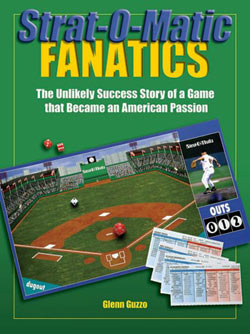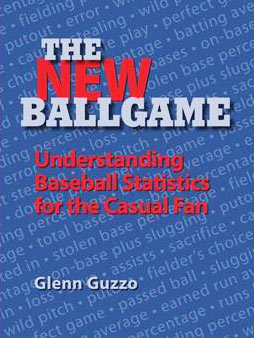Issue #1, January 2013, Part II
**
Interview with Glenn Guzzo (Part II of II)
**
(conducted by Wolfman Shapiro, here is the second part of Mr.
Guzzo interview)
 Wolfman:
Glenn, (continuing our interview), I also noticed that on the
Strat-O-Matic Website you have a column you do periodically -
what relationship do you have with the game company - do you
know the people at the game company well? I assume you know Mr.
Richman for example and can you share some special experiences
you have had with your contact with the game company?
Wolfman:
Glenn, (continuing our interview), I also noticed that on the
Strat-O-Matic Website you have a column you do periodically -
what relationship do you have with the game company - do you
know the people at the game company well? I assume you know Mr.
Richman for example and can you share some special experiences
you have had with your contact with the game company?
Glenn:
I
began interviewing Hal Richman for newspaper articles in 1976. I
visited Strat-O-Matic several times after that, for Opening Days
and other visits, where I got to know other employees, such as
Steve Barkan and James Williams. Then, with STRAT FAN, regular
interaction with all of them, Bob Winberry and others was a very
happy necessity. I have gotten to know their families and today,
the Strat-O-Matic family is like family to me. I spent a couple
nights at Winberry's home on one visit. I have shared several
dinners and other occasions with Hal and his wife Sheila. Barkan
stopped by my place in Florida for lunch and some Strat chat
while he was on vacation.
For the
last 10 years I have had a growing relationship with the company
as the author of website articles and the publisher of some
Strat-O-Matic publications (the newsletters and the Baseball
Ratings Book). For the last six or seven years, I have done a
good bit of the work on the baseball and football ratings.
For many
years, Hal and Bob asked my opinion on potential products, rule
changes and other matters. In recent years, that involvement has
grown, too, in my role as a consultant to the game company.
One
amusing episode: I was testifying in a very serious lawsuit in
Wyoming when the attorney questioning me asked about my role as
the "spokesman" for this company called Strat-O-Matic. So here I
am, under oath on a matter having nothing to do with sports,
testifying that I have never been an employee of the company and
am not the spokesman, but I had literally written the book on
the hobby.
Wolfman:
Now of course everyone knows you as the author of the book, "Strat-O-Matic
Fanatics" - how many copies of this book has been sold? Where
did the idea for the book come from? What does the book cover?
Thanks for mentioning my work with my friends for the SOM
conventions we did from 1974-1980.
How much
did the game company support you during the writing of this
book? How can a person get a copy?
Glenn:
When
I left The Denver Post, I had three immediate job offers. In
addition, I knew I was going to do a couple of consulting jobs
right away, then join an outfit in Washington, D.C. that trains
journalists in newsrooms across the country. I was co-chair of
the national convention of the Society for American Baseball
Research (SABR) to be held in Denver. But the thing I wanted to
do most was to write the book that had been in my head for years
about this crazy, wonderful hobby that means so much to such a
wide array of people. I interviewed more than 50 people for this
book, and the reporting process began by spending a week with
Hal and his wife in their Massachusetts home. All day for six
days, I recorded interviews with Hal about the game's origins,
its critical moments, Hal's greatest achievements and his
unfulfilled dreams.
I did
not set out to write something encyclopedic, though the book
might be that. I did not set out to write a biography, though
Strat-O-Matic Fanatics qualifies as that, in part. I set out
to write a story. A story about how this game managed to
survive, and thrive, against the odds that would have stopped
almost everybody I know. And in so doing, I was determined to
take readers to places they had not been -- to Hal Richman's
childhood bedroom and his summer camps, to the meeting room
where Hal and his lawyer had a showdown with baseball player
union chief Marvin Miller, to the stoop of Spike Lee's childhood
brownstone in Brooklyn where he and his friends became "addicted
to Strat." To the previously secretive "klatch" where
Strat-O-Matic decides the baseball fielding ratings. And to a
whole lot more places where Strat-O-Matic has flourished.
So the
book became a small-business success story of classic Americana,
but even more it became a powerful human-interest story about
how Hal Richman persisted against the odds and a dozen betrayals
because this creation of his was once his sole source of
self-worth -- his very being depended on its survival.
As a
writer, I find it very satisfying that the story, published in
2005, holds up very well when I re-read it today. I'm ecstatic
when I hear from gamers who have read the book repeatedly and
still love it. One of them told me he reads it every year before
he starts playing with the new baseball cards. I think the book
has sold about 7,000 copies. There are many more current and
former Strat-O-Matic gamers out there. If you haven't read the
book or know someone else who should, you can get them from the
publisher, ACTA Sports (click
here to get Glenn's book at a discount from the
publisher, a special deal we arranged for our members),
on Amazon.com and other online book sites.
Wolfman:
Now I have read on-line via some of your articles that you
actually play in various SOM Baseball Leagues. Are there any
tips or advice you can give to our readers that might help them
with their own game play? Do you have a favorite team or teams
that SOM has created cards for that are your favorite teams?
Glenn:
The
thing I've had consistent success with is in start-up drafts for
keeper leagues. But I've had to stop participating in those
leagues since I began doing SOM's ratings. It would be a
conflict of interest to be doing ratings for players I owned or
competed against in leagues. So now I can reveal my strategies
without sabotaging my own chances.
In a start-up draft, I make it my mission to compete immediately
for the pennant and be dominant in three years. These are
essential features of such a draft:
-
The most important
thing is a balanced team -- one that can win in any park against
any opponent. That's offensive/defensive balance,
power/small-ball balance and lefty-righty balance. The only way
to achieve that is to draft multi-skilled players. A team cannot
have enough batting average, on-base percentage, power, speed
and defense (five separate skills) throughout the lineup if its
players do not deliver in several of these categories.
-
The first several
picks MUST be able to contribute very well now AND in the
future. As many picks as possible should fit both categories.
-
I group the talent
in tiers. First tier is THE most desirable players in the draft,
heads and shoulders above the rest. In a 16-team draft of 1959
players, I identified about 35 such guys. If one is on the
board, I MUST draft him over any other player, regardless of
need (but in a start-up draft need is not usually an issue early
in the draft). If I got three in that draft I would be happy. I
got four and felt I had a strong advantage. (That team won the
first pennant and won again with something like 116 wins in Year
Three.)
-
The second tier is
more now-plus-future guys, just not the five-skill and
four-skill players in the first tier. This might be a nice-sized
group, certainly more than the number in the first tier.
-
The third-tier is
guys with maybe two skills, with one dominant.
-
In the third and
later tiers, where it's a choice between a do-it-now guy and
future value, whichever has the highest upside wins. Great now
beats solid later. Great later beats solid now.
-
We want offensive
players who can get themselves in scoring position. Power does
that. High on-base and singles hitters who can steal do that.
Walkers who are slow do not. Fast guys with low on-base do not.
-
Anyone on the bench
must be able to deliver a hit. No one makes the roster only for
his speed or defense.
-
Defense is a single
assessment involving the whole package -- range, errors, arm.
Good range and a high error rating is a defensive liability. A
+2 arm in CF is a defensive liability, even for a "1". A
tremendous offensive player might be worthwhile despite being a
defensive liability at the corners. But a team with a critical
mass of defensive liabilities means that almost any X-chance is
a risk. That team will have fewer outs offensively than its
opponents.
-
There's more to
consider about pitching, injury history, and other factors. But
the same principles apply to pitching as offense -- balance in
the rotation and bullpen (separately), current and future value,
multi-skills (low hits, on-base, power and solid defense that
includes the whole package -- range, errors, hold, wp/bk). High
walks plus high wp/bk is a deadly combination. Add a bad hold
rating to that and the guy is off the list for current value.
Note
that this draft strategy may not be the best for a short-term
competition, such as a STAR Tournament or a league that
re-drafts most of its talent every year.
After
a good draft that achieves balance, we'll find that we have a
tactical advantage in most game strategy -- more good moves
available than our opponents.
A few
years ago I finally read the The Art of War, which
emphasizes being prepared to win under any circumstances. It's
an ancient book written about battle but became a very popular
book in contemporary business circles. The author wrote about
balance and I thought, "Yeah, this guy would have been a good
Strat-O-Matic GM and manager."
Wolfman:
Do you
have any future projects linked to Strat-O-Matic you are
involved with (whether it's the baseball game or one of the
other games)?
Glenn:
I have more projects in mind than I'll ever get to. But
the past couple of years, I decided just to be assertive and
play, without worrying about which projects I should do first.
After participating in a 1964 replay with a half dozen other
gamers, those friends got busy with other things last year. So
in 2012 I completed solo replays of the 1958 National League and
the 1961-62 NHL season. Both turned out very realistically with
spectacular highlights along the way. I've been playing college
football with 2011 LSU against other good teams from that year
and with the great-teams set.
In 2013, I will use the baseball board game to play a
shorter season of "Beautiful Losers" -- strong contenders that
fell short of the pennant. That's the 1948 Red Sox, 1951
Dodgers, 1954 Yankees, 1959 Braves, 1961 Tigers and 1962
Dodgers. I have started a baseball league of 22 teams consisting
of all the Hall of Fame, Baseball Heroes and Negro League
players. Because of the size of that league, it may be an
evergreen project that I just dive into from time to time
because I love all of those sets. I want to do something with
teams that might be among SOM's best ever, but do not usually
get mentioned that way: 1948 Cleveland, 1955 Brooklyn, 1957
Milwaukee, 1968 Detroit.
The non-baseball possibilities for 2013 are great-teams
projects for hockey ('70s and '80s Boston, Philly, Montreal,
Islanders, Oilers), basketball (the diverse group of NBA winners
in the '70s), pro football (the 1960s AFL) and college football
(the recent SEC winners).
While great-teams projects are irresistible to
contemplate, I've had more fun playing full leagues or full
divisions. Strat-O-Matic Fanatics describes Hal's love of
the underdog -- he considered himself one -- but it's also part of
Strat-O-Matic's genius that the bad players and bad teams
compete with the good ones. Over the course of a season, we
really see the stars shine in that environment. And that's when
the stats are so realistic that the players are life-like.
Wolfman:
How
would you like the Strat-O-Matic World to know you Glenn? If you
could describe yourself in one sentence what would you write?
Glenn:
Sincerely, I don't think that's my privilege to say. The
people I admire most are those precious few who bring out the
best in others and so I dedicate myself to that. There are only
a few in each pro sport. As someone who often recruited
nationally for top talent, I can tell you that's the rarest
quality in workplace supervisors. The highest honor I've ever
received as a leader in business, community work or sports is
when others are enthusiastic about being on my team, because
they trust my commitment to quality and my commitment to their
success. The best leaders are servant leaders and I
enthusiastically follow one, Jesus Christ. STRAT FAN,
Strat-O-Matic Fanatics and the work I do for the game
company all have been about serving those in the hobby.
Wolfman:
Can
people contact you on-line, is this possible and if so what is
the best way?
Glenn:
If there's a way I can help, I always will try. My email is
glennguzzo@aol.com
Wolfman:
Thank
you, Glenn, for taking time out of your busy schedule to do this
interview with us. I am sure I speak for others in our community
that we are grateful for all the great work and projects you
have done to provide benefits
for other gamers and to honor the game we all love. It has been
a pleasure to hear your story and to get a peek at the inner
workings of SOM Baseball.
Glenn:
You are far too kind. Thank you for asking. I
wish you all the best with your new venture and wish you and
everyone else many blessings. Keep smiling.
----------------------
Editor's Note:
As we mentioned in the
article, Glenn is the author of the definitive book about
Strat-o-matic called "Strat-o-matic Fanatics". If you click on
the cover of the book below, it will take you to his publisher
site, Acta Sports, where we have arranged for you to be able to
order this book at a special discount - make sure the Promotion
Code of SOMB is showing to get your discount.
Further, you may
not be aware of this but Glenn wrote another book called "The
New Ball Game" which Glenn explains how to understanding various
baseball statistics to appreciate the game of Baseball in a new
light. We recommend strongly both of these books which following
the links below will offer our a members a special discount.
Also if you visit our "Recommended Resources" page, there are
other key baseball books from Acta that will help you enjoy
Baseball and our game as well.

The Definitive Book about
Strat-o-matic
by Glenn Guzzo, click on the book cover to
read more or purchase your copy at a discount

Here is Glenn's Other Book dealing
with Baseball Statistics, click
on this cover to obtain this
book again at the special discount
Other Sections to view in this exciting issue :
(to view the interviews, articles and special sections click on
the links {underline} and this will take you to the appropriate
webpage)
♦
RETURN TO NEWSLETTER MAIN PAGE
♦
ARTICLE with MICHAEL MCLAUGHLIN --
moderator/administrator from the Stratomatic Baseball Village,
an SOM baseball forum and partner for the newsletter discusses the great
George Shuba.
♦
COLUMN with MARC WASSERMAN--
commissioner of the Cyber Baseball Association (CBA) begins a
new column about what it is like to be a League Commissioner.
♦
COLUMN with WOLFMAN SHAPIRO --
editor of "The Ultimate Strat Newsletter" and 2012 CBA Champion.
Wolfman takes us back to the first national Strat-o-matic
Convention in 1972 as he was present. This column will be based
primarily upon the articles
from the Strat-o-matic Review that covered the national
Strat-o-matic conventions from 1972-1980
(including the ones organized by the Wolfman and his friends
from Chicago). We will continue to share one new convention in
this issue forward till all are shared.
♦
QUIZ
& POLL ABOUT THE SOM BASEBALL CARDS
submitted
originally by Marc Wasserman with a new poll from the Wolfman.
The quiz questions about the Baseball Cards and unique ones were
not answered before so we will try again before we give the
answers.
♦
RECOMMEND
ON-LINE SOM RESOURCES
-- other
on-line strat-o-matic websites that offer amazing information
(all sports), special tools and products to improve game play
which we have been in personal contact with and agree with our
idea to help cross promote each other.
Contact Us for Questions or Submissions:
Wolfman Shapiro
Founder/Editor, the
Ultimate Strat Baseball Newsletter
email:
wolfmanshapiro@gmail.com
facebook:
www.facebook.com/wolfman.shapiro
twitter:
@StratBaseball4U
To Sign Up and Become a Member of this Newsletter
http://www.UltimateStratBaseball.com
(this provides direct emails when our bulletins
and next
issues come out)